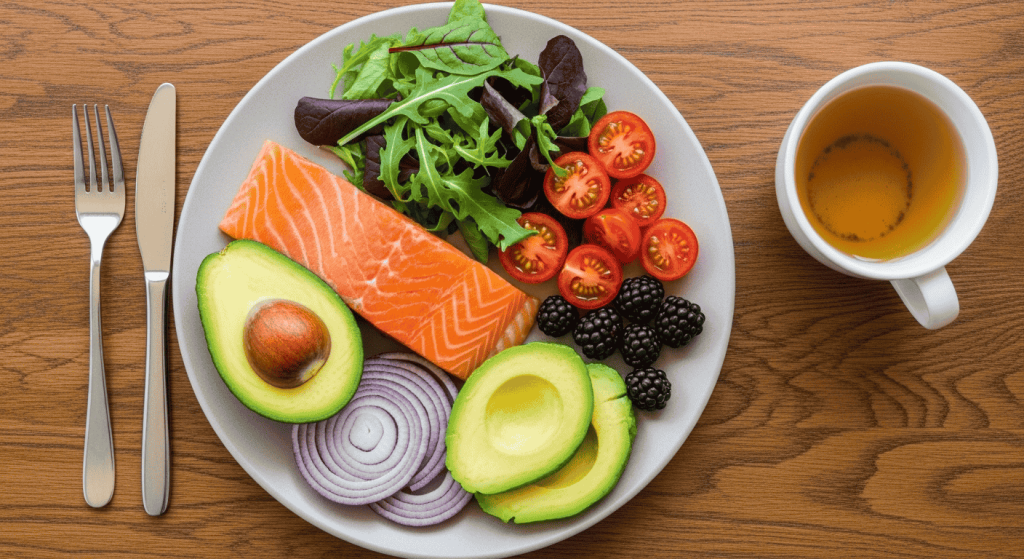Introduction: Why an Anti-Inflammatory Diet Matters
Chronic inflammation is linked to serious health conditions such as heart disease, diabetes, arthritis, and even cancer. Fortunately, research shows that what you eat can have a profound effect on inflammation in your body. This is where the anti-inflammatory diet shines. Incorporating anti-inflammatory foods into your daily meals can help reduce inflammation, boost immunity, and improve overall health.
Let’s explore the best anti-inflammatory foods, backed by science, to include in your daily diet for long-term wellness.
How to Set Goals and Actually Achieve Them in 2025
🥦 Top 10 Best Anti-Inflammatory Foods Backed by Science
1. Berries
Berries like blueberries, strawberries, raspberries, and blackberries are loaded with antioxidants such as anthocyanins. These compounds help reduce inflammation and support your immune system.
Why it works:
-
High in fiber and vitamin C
-
Rich in anti-inflammatory polyphenols
Try This: Add a handful of berries to your morning oatmeal or smoothie.
2. Fatty Fish
Salmon, sardines, mackerel, and tuna are rich in omega-3 fatty acids—one of the most powerful nutrients for combating inflammation.
Scientific Insight: Omega-3s have been shown to reduce levels of C-reactive protein (CRP), a key marker of inflammation.
Serving Tip: Eat fatty fish at least twice a week.
Mental Health Tips for Young Adults
3. Leafy Greens
Spinach, kale, and Swiss chard are not only high in vitamins but also packed with flavonoids and antioxidants.
Benefits:
-
Detoxifies the body
-
Supports healthy cell repair
-
Reduces inflammatory markers
4. Turmeric
Turmeric contains curcumin, a natural anti-inflammatory compound. According to research, curcumin can rival some anti-inflammatory drugs—without the side effects.
Pro Tip: Pair turmeric with black pepper to enhance curcumin absorption by up to 2000%.
How to Save Money on Groceries in 2025
5. Nuts and Seeds
Walnuts, almonds, chia seeds, and flaxseeds are rich in healthy fats and magnesium—both known to reduce inflammation.
Best Choices:
-
Walnuts: High in ALA omega-3s
-
Almonds: Packed with vitamin E
-
Chia & flaxseeds: Great for fiber and lignans
6. Olive Oil
Extra virgin olive oil is a staple of the Mediterranean diet, which is known for its anti-inflammatory benefits.
Active Compound: Oleocanthal, which acts similarly to ibuprofen.
How to Use: Drizzle over salads, veggies, or whole grains.
High Protein Vegetarian Meals
7. Tomatoes
Tomatoes are rich in vitamin C, potassium, and lycopene—a powerful antioxidant with anti-inflammatory effects, especially beneficial for reducing lung and prostate inflammation.
8. Green Tea
Green tea contains EGCG (epigallocatechin gallate), a catechin known to reduce inflammatory cytokines and prevent cell damage.
Health Tip: Replace sugary drinks with 1–2 cups of green tea daily.
9. Avocados
Avocados are high in heart-healthy monounsaturated fats, fiber, and carotenoids—all of which fight inflammation.
10. Whole Grains
Oats, brown rice, quinoa, and barley are rich in fiber, which feeds your gut bacteria and helps lower CRP levels.
🥗 Sample Daily Anti-Inflammatory Meal Plan
| Meal | Suggested Food Items |
|---|---|
| Breakfast | Oatmeal with berries, chia seeds, and a cup of green tea |
| Lunch | Grilled salmon salad with leafy greens, olive oil, and tomatoes |
| Snack | A handful of almonds or walnuts |
| Dinner | Brown rice, steamed broccoli, turmeric chicken, and avocado |
✅ Benefits of an Anti-Inflammatory Diet
-
Reduced risk of chronic diseases
-
Improved digestion and gut health
-
Better mood and energy levels
-
Support for joint and skin health
🧠 FAQs on Anti-Inflammatory Foods
Q1: What are the best anti-inflammatory foods to eat daily?
A1: The best daily choices include berries, leafy greens, fatty fish, nuts, olive oil, and turmeric. These are proven to reduce inflammation and promote health.
Q2: Can an anti-inflammatory diet help with weight loss?
A2: Yes! Many foods that reduce inflammation are also low in processed sugars and high in fiber, which helps manage weight naturally.
Q3: How soon can I notice results from an anti-inflammatory diet?
A3: Some people notice improved energy, digestion, and reduced joint pain within 1–2 weeks. Long-term effects like disease prevention take consistent effort.











